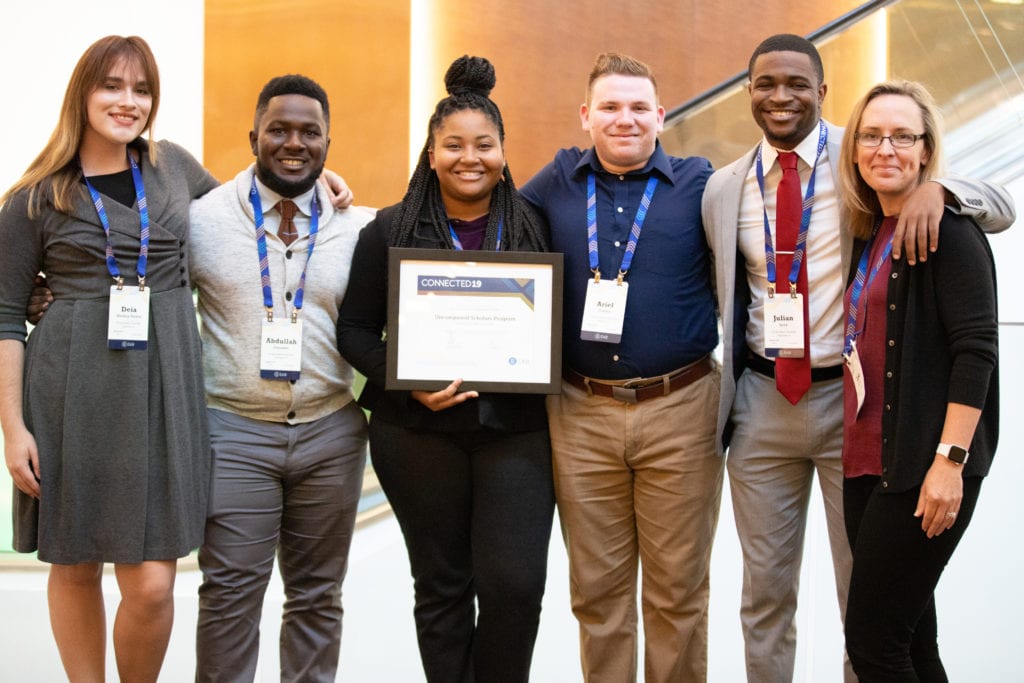3 things students experiencing homelessness need campus leaders to know
Originally published by Kathleen Escarcha on November 19, 2019; re-published on April 19, 2022.
There are over 1.3 million identified homeless children and youth across the United States. In the 2019-20 academic year, over 41,000 applicants indicated homelessness on the FAFSA. Homelessness affects 14% of college students, and even more experience housing insecurity.
In 2012, Florida State University (FSU) established the Unconquered Scholars Program to elevate the needs and voices of these students to ensure their academic success and long-term independence. To qualify for the program, students must have experienced foster care, relative care, homelessness, or be a ward of the State. The program has grown from 15 students at its inception to almost 100 active students today. Graduates have gone on to medical school, law school, and doctoral programs.
Because homelessness continues to be a pressing concern (and further exacerbated due to the COVID-19 pandemic), we’re revisiting our panel with Unconquered Scholars from CONNECTED19-our national student success summit-to shed more light on the barriers that students who have experienced homelessness face and how campus leaders can help.
 Florida State University’s Unconquered Scholars at CONNECTED19
Florida State University’s Unconquered Scholars at CONNECTED19
1. Keep students’ needs at the center
To build a successful support program, leaders need to keep students’ needs at the center, says Lisa Jackson, the director of the Unconquered Scholars Program. “Students who have experienced homelessness are the experts on what they need,” says Jackson.
“Students who have experienced homelessness are the experts on what they need.”
Lisa Jackson Senior Program Director, Academic Support & Engagement
The panelists stressed that they need leaders to be patient, understanding, and creative when approaching them with on-campus resources. Students who have experienced homelessness are incredibly resourceful and resilient, they want to maintain their independence and may find it uncomfortable asking for help, says Jackson.
For example, panelist Julian Levy, a first-generation student and social work major, recalls being skeptical when he first encountered the Unconquered Scholars Program. People who offer help “can seem like they have a savior complex, especially if they don’t look like you or have the same experiences,” says Levy. He only began to trust Jackson when he noticed that she remembered details about his personal life and younger brothers. “Miss Jackson understood that I did not need saving; rather, she focused on my strengths,” explains Levy.
Sometimes hearing from a peer who has experienced homelessness can put prospective Unconquered Scholars at ease. When panelist Asia Lavender applied to FSU, she says that an Unconquered Scholar called her to talk about the program. Now, Lavender says that calling prospective students to talk about being an Unconquered Scholar is one of her favorite parts of the program.
Students may also be looking for cues in administrators’ offices to decide who they can trust, says panelist Ariel Trueba. He points out that while many higher ed offices only include a desk and two chairs, Jackson’s office felt more welcoming. “She makes her office very comfortable with a couch. The office setting allowed me to express more of what I wanted to tell her.”
2. Acknowledge that students juggle more than coursework
“People often think struggling ends once you get to college,” says Levy. But while students may have housing, their families may still be struggling with homelessness back home. The panelists shared that this dynamic can lead to distressing phone calls or financial requests from family members that make it difficult to concentrate on coursework.
Panelist Abdullah Derosier, a recent FSU grad, adds that he felt “obligated to support family members still experiencing homelessness.” Students have to “balance doing what’s best for [them] and what’s best for [their] family,” he says.
Many panelists also hope their college journey will inspire their siblings to take a similar path. When Levy shared his recent accomplishment of helping his younger brothers complete their college applications, the audience broke out into applause.
To help students succeed in college, administrators can help them establish boundaries. For example, the Unconquered Scholars Program helps students open private bank accounts, says Jackson. Administrators can also help students understand how the long-term benefits of a college degree can outweigh the short-term benefits of leaving college to support their families.
3. Recognize students’ strengths and potential
Many panelists shared that evidence of their success and their peers’ success help them overcome feelings of self-doubt. For example, Lavender shared that getting her first ‘A’ helped her realize she could succeed in college.
“Students experiencing homelessness are not just struggling to get through college. They’re also successful, involved on campus, and have a drive to succeed.”
Deia Medley-Neyra an Unconquered Scholar
Similarly, panelist Deía Medley-Neyra said that one of her greatest accomplishments as a first-year student was “proving to [her]self that [she] belongs” in college. Medley-Neyra urged the audience of student success leaders to understand that students who have experienced homelessness are “not just struggling to get through college. They’re also successful, involved on campus, and have a drive to succeed.”
Administrators can help students overcome imposter syndrome by emphasizing that they are “uniquely qualified to be in college because of the challenges they’ve experienced,” says Jackson. She adds that the Unconquered Scholars Program, named after the Seminole people, emphasizes resilience and persistence even in its name. “The Seminole nation never surrendered to the government and continued to persist. It represents the students’ spirit. These students refused to give in to their circumstances; they kept pushing to make it all the way to FSU and are now preparing themselves for independent life after earning a degree,” says Jackson.
More Blogs

How to navigate policy challenges and show support for your trans students

Our LGBTQ students’ lives and wellbeing are at risk—here are 5 things campus leaders can do to help
